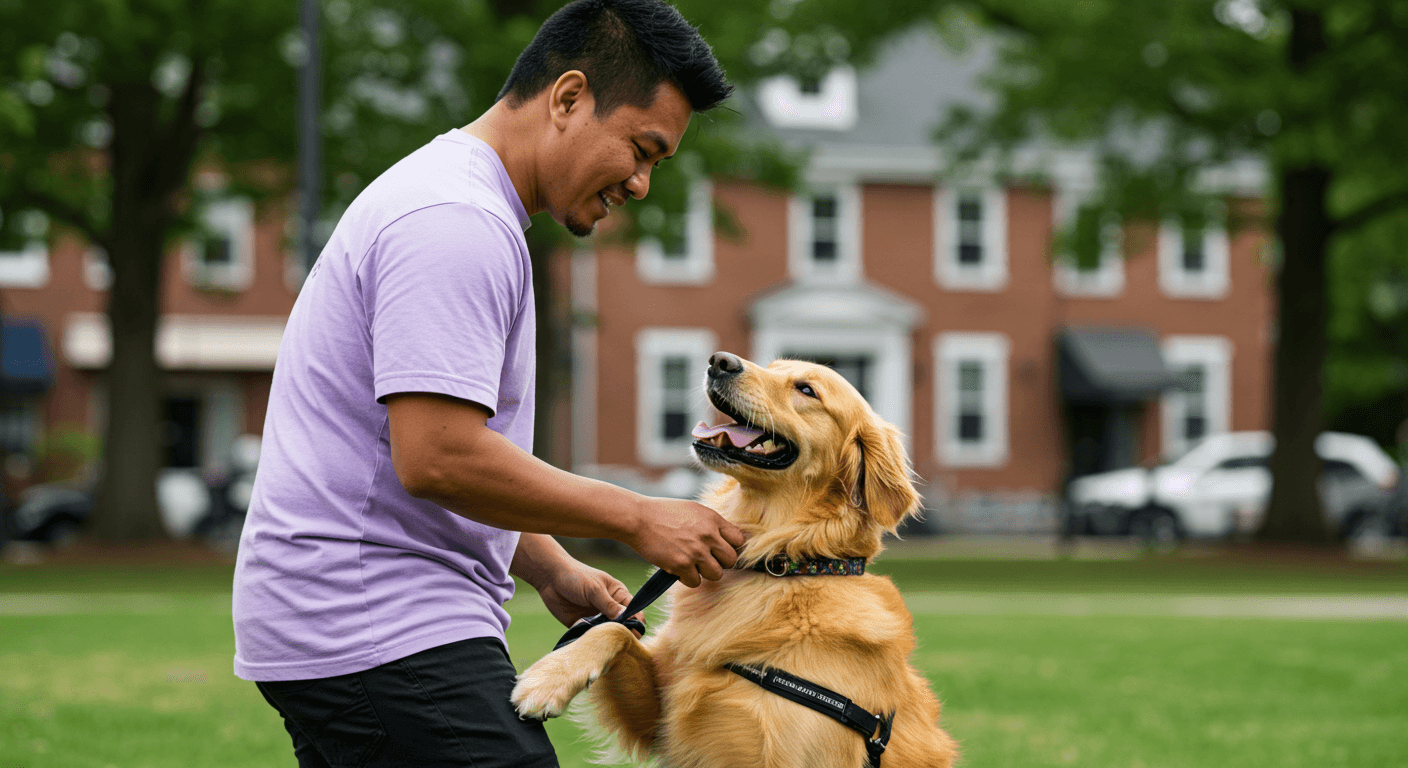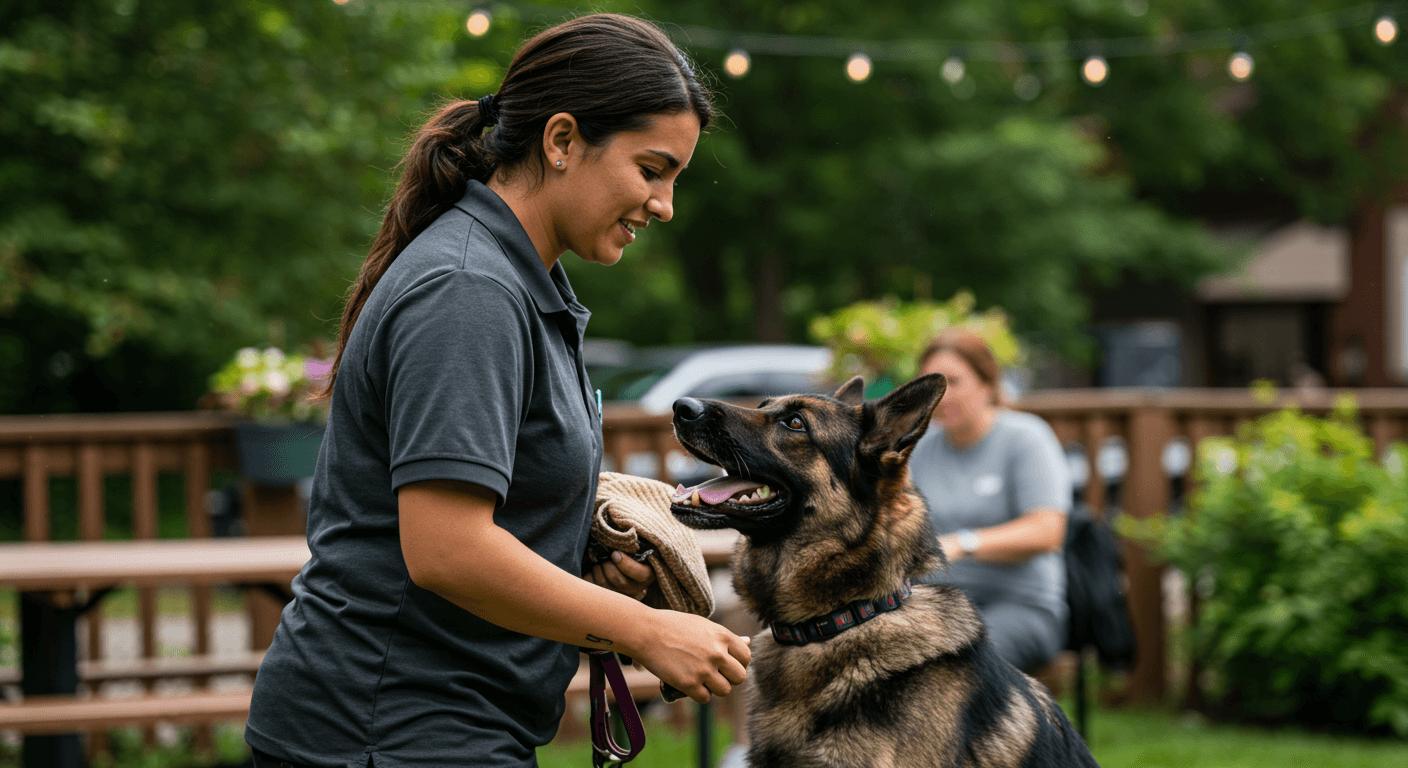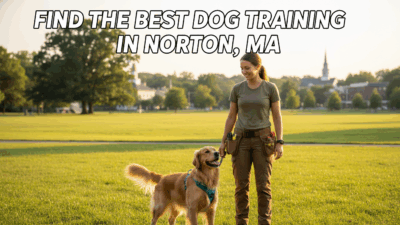Your Complete Guide to Choosing a Dog Trainer in Norton MA and Surrounding Areas
Living with a dog in Norton means you’ll be navigating the town’s conservation areas, handling encounters with wildlife around the Canoe River, and keeping your dog calm during neighborhood walks where deer sightings are common. Your dog needs to stay focused when you’re passing other dogs on Bay Road or staying polite at local veterinary clinics.
Since Norton sits in Bristol County, most rules follow Massachusetts state law along with local town bylaws. When you find a trainer who understands these requirements, you’ll see better results both in your home and around town.
How to Choose the Right Trainer
Start by looking for someone who uses positive reinforcement training and can set realistic goals for your Norton lifestyle. This means your dog should learn to walk calmly past distractions, stay focused near busy school zones, and handle veterinary visits without stress.
Credentials give you a quick way to compare trainers’ experience levels. Common dog trainer certifications include KPA-CTP, CPDT-KA, or IAABC-CDBC for behavior problems. If your dog has serious aggression issues, look for someone with CBCC-KA or a science-based program like CTC.
In-home dog training works great for puppy training, door manners, and neighborhood leash skills. Group classes make sense once your dog can focus around other dogs, especially before you try busier locations in nearby Attleboro or Mansfield.
Common Dog Training Methods Explained

Reward-based methods build the trust you want while creating lasting behavior changes. They also help you follow Norton’s local ordinances about keeping dogs under control in public.
Basic obedience covers sit, down, stay, place, recall, and leash training so your dog can handle walks, outdoor dining areas, and park visits without pulling or jumping on people. These skills matter even more when you’re navigating Norton’s narrow sidewalks or waiting outside the post office.
Puppy classes focus on socialization, potty training, bite control, crate comfort, and early leash manners. Starting with short, positive training sessions prevents bad habits from forming in the first place.
Behavior modification addresses fear, reactivity, resource guarding, or separation anxiety through careful desensitization and counterconditioning. For serious cases, ask if your trainer works with local veterinarians who understand behavior.
Private lessons and in-home sessions let you customize everything around your daily routines, while day training can speed up results when you’re short on time. Board and train programs involve sending your dog to the trainer’s facility for intensive work, though these require careful vetting to ensure humane methods.
Group classes help your dog practice good manners around other dogs and people. The best dog training classes give dogs plenty of space, screen participants carefully, and teach calm behavior rather than just excitement.
Specialized training like therapy dog training or service dog training requires extra structure, public-access skills, and a very clear step-by-step program. Massachusetts has specific regulations around service animals, so make sure your trainer understands these rules.
Stay away from trainers who use fear, intimidation, or pain to get results. Humane methods are safer for everyone, easier to maintain long-term, and much better for keeping peace with your neighbors.
Average Cost of Dog Training in Norton MA and Surrounding Areas (Updated for 2025)
Prices around Norton and Bristol County depend on the trainer’s experience, how long sessions last, and where the training happens. Here’s what most local pet owners are paying in 2025.
| Service Type | Average Cost (Norton/Bristol County) |
|---|---|
| Puppy classes (4-6 weeks) | $160-$290 total |
| Group obedience classes (4-6 weeks) | $175-$325 total |
| Private lessons (60-90 min) | $120-$200 per session |
| In-home coaching packages (4-6 visits) | $450-$950 total |
| Day training (trainer works your dog + handoff) | $475-$975 per week |
| Behavior consult for reactivity/anxiety (initial) | $150-$275 |
| Board and train (2-4 weeks) | $2,200-$4,800 total |
You’ll probably pay extra travel fees for longer distances within Bristol County, and expect higher rates for complex behavior work. Professional dog trainer rates may run higher if they have advanced certifications or specialize in aggressive dog training.
Make sure you understand what’s included, how the trainer tracks progress, and whether they offer a free consultation or free evaluation before you sign up. Many expert dog trainers will meet with you first to assess your dog and explain their training program.
Questions to Ask a Potential Dog Trainer
- What training methods do you use, and how do you keep sessions positive and low-stress?
- What credentials do you have, like KPA-CTP or CPDT-KA? Do you keep up with continuing education such as CPDT-KSA?
- How will you customize the training plan for my dog’s specific needs and our Norton lifestyle?
- Do you offer in-home visits, dog training classes, or day training, and which approach fits my goals best?
- How will we measure my dog’s progress and know when to add more distractions?
- What are the total costs, including any travel fees, and what’s your cancellation policy?
- Do you carry liability insurance, and can you show me proof?
- For behavior problems, will you work with my veterinarian if needed?
- What should I practice between our training sessions to help your dog keep improving?
Local Norton Rules and Considerations
Norton enforces leash laws and nuisance rules to keep neighborhoods safe for everyone. Massachusetts state law also sets requirements for rabies vaccination and dog licensing.
Dogs must be leashed and under control in all public areas unless inside a designated off-leash area. Keep a standard 6-foot leash with you for walks around town and visits to conservation land.
Massachusetts law requires current rabies vaccination for all dogs over six months old. You must obtain a dog license from the Town of Norton annually, which requires proof of rabies vaccination and proof of spay/neuter if applicable. Contact the Town Clerk’s office for licensing details.
Norton’s bylaws address excessive barking and nuisance complaints, so work with your trainer on alert barking and separation anxiety before neighbors get frustrated. Massachusetts General Law Chapter 140, Section 157 gives authorities the power to address dogs that are a public nuisance.
Massachusetts doesn’t require special licenses for dog trainers, but if a business boards dogs for payment, the facility may need to follow boarding kennel regulations. The Massachusetts Department of Agricultural Resources oversees animal-related business licensing.
Bristol County doesn’t have additional trainer licensing requirements beyond standard business regulations. Make sure any certified dog trainer you hire carries liability insurance for their dog training services.
Local Norton Resources for Dog Owners and Surrounding Areas
These spots give you great places to practice polite manners, work on socialization, and provide safe enrichment for your dog. Always follow the posted rules and etiquette guidelines.
- Norton Reservoir offers walking paths where leashed dogs can practice calm focus around joggers, cyclists, and families. This is excellent for building real-world obedience training skills.
- Canoe River Aquifer Park provides trails for leashed dogs and opportunities to work on recall with a long line in quieter sections. The varied terrain helps your dog generalize training.
- Borderland State Park in nearby Easton welcomes leashed dogs on most trails and gives you perfect opportunities to practice focus around wildlife, other dogs, and changing environments. The park’s layout makes it ideal for distance work and building a well-behaved dog.

FAQs
How much does in-home dog training cost?
Most Norton trainers charge $120-$200 per in-home visit, with discounts available when you buy packages. Behavior problems or aggressive dog training typically start at the higher end of that range.
Is in-home dog training worth it?
Absolutely, because you’re working on problems exactly where they happen. Your trainer can fix door manners, jumping on guests, counter-surfing, and yard reactivity right at home, then step outside to practice leash skills on your actual neighborhood streets.
Can you pay someone to house train your dog?
Yes, many trainers offer puppy programs that include potty training, crate routines, and daily schedules. Day training can speed up the process while teaching you how to maintain the progress through consistent training sessions.
What is the 3-3-3 rule for dog training?
This is a helpful timeline for new or adopted dogs: expect about 3 days for your dog to decompress, 3 weeks to learn your routines, and 3 months to feel completely settled. Good training programs work with this natural adjustment period.
How long will it take to reach my training goals?
Most puppies and friendly adult dogs show solid progress within 4-8 weeks if you practice daily. Fear, reactivity, or separation anxiety typically requires several months of careful behavior modification with gradual increases in difficulty.
What should I bring to group classes?
Pack a flat collar or harness, a 6-foot leash, high-value treats, water, and current vaccination records if your trainer requests them. Leave retractable leashes at home for safety reasons.
What’s the leash law in Norton?
Dogs must be leashed and under control in all public areas. Norton’s bylaws require owners to keep dogs from running at large, and Massachusetts state law supports local leash requirements.
Do I need a dog license in Norton or Bristol County?
Yes, Norton requires all dogs over six months old to be licensed annually through the Town Clerk’s office. You’ll need proof of current rabies vaccination and spay/neuter documentation if applicable.
What shots does my dog need in Bristol County or Massachusetts?
Rabies vaccination is required by Massachusetts law for all dogs over six months old. Your veterinarian may also recommend distemper-parvo, leptospirosis, and bordetella based on your dog’s lifestyle and exposure risk.
Are dog trainers required to be licensed in Norton or Bristol County or Massachusetts?
No special trainer licenses exist in Massachusetts. Trainers follow normal business regulations, but if they offer boarding services, their facility may need to meet state boarding kennel standards through the Massachusetts Department of Agricultural Resources.
Where can I practice off-leash recall?
Since Norton doesn’t have dedicated fenced dog parks, your safest option is using a long line in open areas of conservation land during quiet times. You can also check nearby communities like Mansfield or Attleboro for fenced facilities.
Which dog parks allow training around Norton?
Norton doesn’t currently have a dedicated public dog park within town limits. For fenced off-leash areas, you’ll need to travel to neighboring towns like Attleboro’s Dog Park or facilities in Mansfield, which offer safe spaces for recall practice and socialization.
What beaches or trails allow dogs for training?
While Norton doesn’t have beaches, Borderland State Park in nearby Easton allows leashed dogs on most trails and provides excellent opportunities for training for dogs in natural settings. The Norton Reservoir trails and Canoe River Aquifer Park also welcome leashed dogs and offer varied terrain for building focus and obedience skills.
How do I find a professional dog trainer in Norton?
Look for trainers who offer a free consultation, use positive reinforcement training methods, and hold recognized certifications. Ask about their experience with your specific training goals, whether you need basic obedience or specialized behavior modification work.
The right combination of thoughtful planning, humane methods, and consistent practice around Norton’s trails and neighborhoods will help your dog become a confident companion. If credentials matter to you, don’t hesitate to ask about dog trainer certifications and how your trainer stays current with new techniques.
